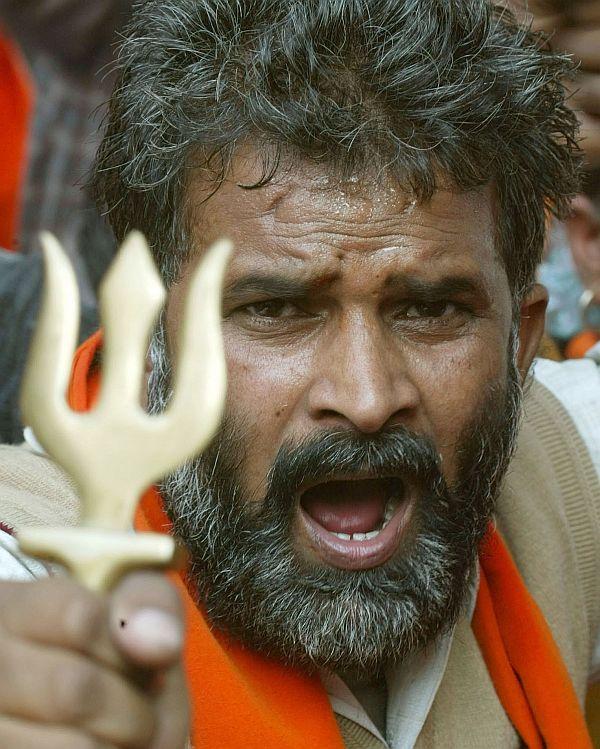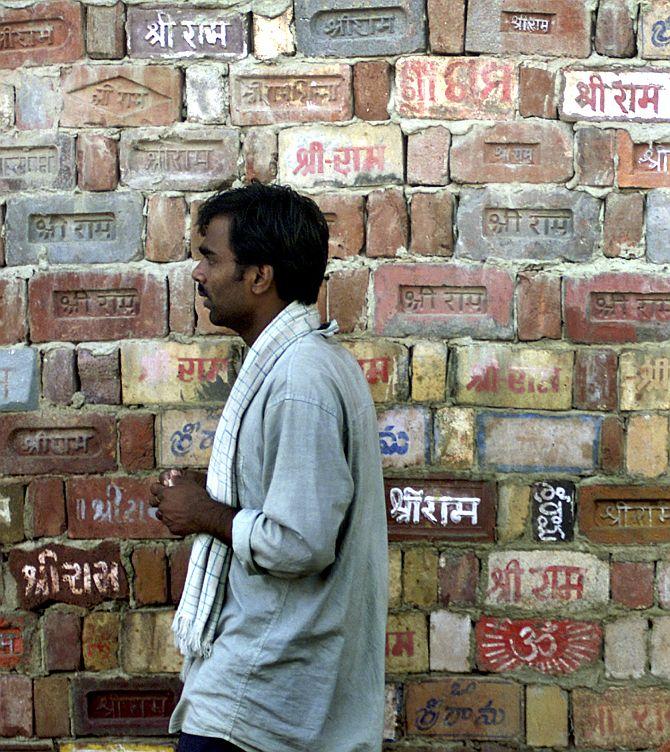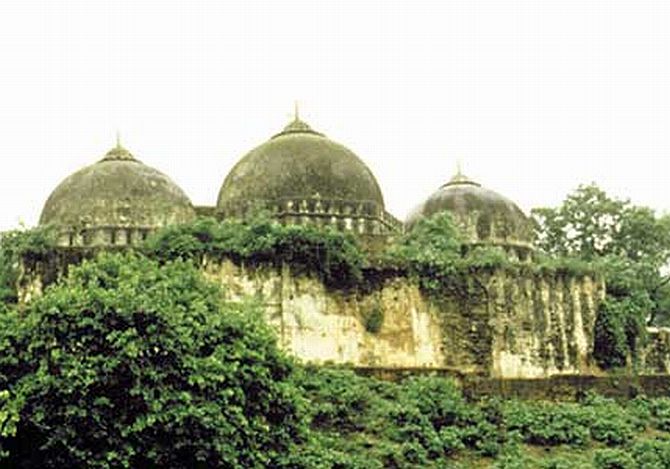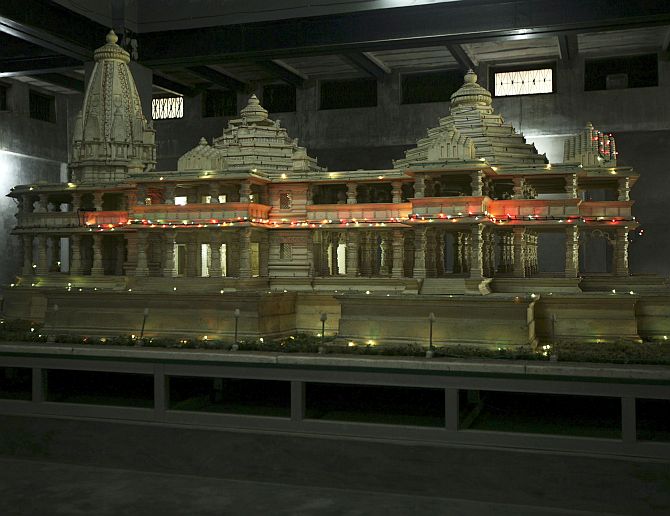
A generation has passed and the demolition appears to be a story of a era gone by, says Sharat Pradhan, who shares his experience as a witness in court in the Babri Masjid demolition case.
On the 21st anniversary of the Babri Masjid demolition, we republish this 2011 special
"How far were you standing from the Babri mosque on December 6, 1992, and what was your position viz a viz the mosque."
Two decades after the fateful day, the question was fired at me by none other than former deputy Prime Minister Lal Krishna Advani's legal counsel Mahipal Aluwalia, during the course of my cross-examination in a dingy Rae Bareli court, holding trial of Advani and others charged of criminal conspiracy behind demolition of the 16th century mosque.
My reply was plain and simple -- "Well, if I knew that you would pose this question to me 19 years later; I would have carried a measuring tape and a compass to know the exact distance and the direction."
Not amused by my reply, the lawyer threw a fresh volley of questions -- "What was the name of the building from where I watched the entire demolition scene?; whether the building was a single-storeyed one or double-storeyed; whether there was a Vishva Hindu Parishad office in the building; what route did I take to reach the Babri Mosque on that day; the names of buildings that I passed; how many security gates did I have to pass; whether the karsewakswore some identification badges... so on and so forth."
...

The cross-examination that ran for days (and the recorded text running into as many as 88 pages) seemed more like a test of my memory rather than any confirmation of how the mosque was pulled down. But when I embarked upon spelling this out by drawing the court's attention to the fact that the lawyer and his team were only testing my memory, he screamed his lungs out -- "now this is contempt of court."
All I had done was to raise a pertinent question -- where was the equity in law when lawyers on both sides remained armed with documents, files and anything else under the sun, while the witness was expected to have a super-human memory to remember every distinct detail of whatever he had seen two decades ago.
Unmindful of the threat, I declared that I was ready to face the music if speaking the truth was seen as contempt.
What I could not understand was why every witness was seen as a liar and the whole idea behind his cross-examination was to prove him as one. I could not resist telling the open court that from the proceedings it was quite apparent that lawyers were probably more used to dealing with tutored and fake witnesses. No wonder, therefore, they found it difficult to come to terms with a true "chashmadeed gawah" (eye-witness).
Later, I was advised not only by the lawyers but even by the presiding officer to bear with the way things were as that was how the practice had been for decades and decades. And since law does not discriminate, the legal procedures and practices remained the same irrespective of the nature of the crime -- be it a theft in the neighbourhood, a murder on the street, a trespass into the property of a neighbour or the demolition of a historic mosque that had changed the communal destiny of the world's largest democracy.
...

About the pace of the process, less said the better. Nineteen years after the demolition of the mosque, the trail court was far from nailing down the culprits to book. In fact, trial was yet to commence against some of the key accused persons including then Uttar Pradesh Chief minister Kalyan Singh, who was otherwise known as the prime culprit.
His matter was pending before the country's apex court which is to decide whether Kalyan Singh should be tried for conspiracy or for inciting communal hatred.
Even the cases against 49 key accused persons was going on in two separate special courts -- one in Rae Bareli and the other in Lucknow, hackneyed procedures and processes had eaten up all the time and no one knows how many more years it would take the courts to take the case to its logical conclusion.
The court in Rae Bareli was holding the trial against Advani and seven others prominent Bharatiya Janata Party (BJP) and Vishwa Hindu Parishad (VHP) leaders -- Murli Manohar Joshi, Uma Bharti, Vinay Katiyar, Sadhvi Rithambara, Ashok Singhal, Acharya Giriraj Kishore and Vishnu Hari Dalmia -- for "inciting communal hatred in the name of the Ramjanmbhoomi-Babri Masjid issue."
The Lucknow special court was hearing cases against smaller fries of the saffron brigade, who were charged of hatching the conspiracy for demolition.
But even as the court in Lucknow appeared more firm and stern, yet there could be no denying that the slow pace of judicial process was equally visible in both places. The lethargic procedures and the hackneyed approach of lawyers who take professional pride lingering the judicial process see no need for expeditious disposal of the case that has clearly lost the appeal it once commanded on the masses of this country.
...

I have spent hours standing in both the courts – answering mundane and irrelevant queries raised by the counsels who seemed to be more interested in displaying and proving their professional skills rather than in taking the case to an expeditious logical end.
The queries have never gone beyond memory test with the sole intent of establishing that my story was just a concoction. What was worse that even the courts do not apparently believe in looking out of the box. When I reacted sharply to what is described as "suggestion" by the lawyer fraternity, I was advised by the court to simply remain cool and take it in the stride – something any forthright person would find it difficult to do.
After all, how can you remain quiet and docile when you are told that whatever you have stated under oath before the court was simply all bunk? No matter how much I controlled my emotions on being publicly labeled as a liar, I could not help retorting, "How would you react if I were to tell you that even though you had grabbed a black coat, your law degree was fake." The advocates looks horrified and were ready to get me sent to the gallows for what they termed as a big "contempt of court".
To me, the whole court exercise looked like a ritual for the benefit of counsels. I never could see any other purpose being served.
When the special court was set up for taking up the demolition case, no one had in his wildest of dreams imagined that the exercise would go on and on endlessly.
In the beginning, when prominent political personalities were summoned to court, they were swarmed by thousands of people who were clearly passionate about the Ayodhya issue. As years went by, their numbers started falling. Today, when I go to the courts, I find no one other than the battery of lawyers engaged in the case to be present.
The crowds have lost interest, a generation has passed and demolition appears to be story of a era gone by. The BJP and its allies have seen the faded electoral futility of the Ayodhya issue. All it continues to spin is perhaps to hold BJP's hardcore Hindutva vote bank together, just as it continues to incite anger and vengeance among a section of Muslims, who use it as fodder for arousing Islamic militancy.
Considering that I was just the 12th witness out of Central Bureau of Investigation's long list of nearly 100, the judicial exercise was bound to take very many years to complete - even if CBI chose to limit its witnesses by avoiding testimony of the entire lot.
The face of the Ayodhya site where Babri Masjid stood until this day 19 years ago is already transformed beyond recognition. The finalisation of the trial proceedings alone may see yet another generation. After all, the trial court was just the first step in the judicial process.